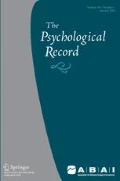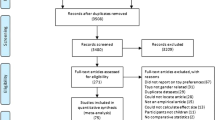Abstract
In order to assess the cross-cultural generality of monetary decision-making processes, American, Chinese, and Japanese graduate students were studied on two tasks: In the delay discounting task, participants made choices between immediate and delayed hypothetical monetary rewards; in the probability discounting task, participants made choices between certain and probabilistic rewards. Some notable cross-cultural similarities were observed. Two-parameter hyperbola-like functions described both delay and probability discounting for all three groups. Moreover, for all three groups the rate at which delayed rewards were discounted was higher for the smaller amount whereas the rate at which probabilistic rewards were discounted was lower for the smaller amount. Some group differences were also observed. As measured by the area under the empirical discounting curve, the Americans and Chinese discounted delayed rewards more steeply than the Japanese. In addition, the Americans discounted probabilistic rewards the most, whereas the Chinese discounted probabilistic rewards the least. Despite these differences, the similarities in the form of the discounting functions and in the effects of amount suggest that there are fundamental commonalities among the three groups with respect to the processes underlying their evaluation of delayed and probabilistic rewards.
Similar content being viewed by others
References
GELL, A. (1992). The anthropology of time: Cultural constructions of temporal maps and images. Berg: Oxford, UK.
GREEN, L., FRY, A. E., & MYERSON, J. (1994). Discounting of delayed rewards: A life-span comparison. Psychological Science, 5, 33–36.
GREEN, L., & MYERSON, J. (1993). Alternative frameworks for the analysis of self control. Behavior and Philosophy, 21, 37–47.
GREEN, L., MYERSON, J., & MCFADDEN, E. (1997). Rate of temporal discounting decreases with amount of reward. Memory & Cognition, 25, 715–723.
GREEN, L., MYERSON, J., & OSTASZEWSKI, P. (1999a). Amount of reward has opposite effects on the discounting of delayed and probabilistic outcomes. Journal of Experimental Psychology: Learning, Memory, and Cognition, 25, 418–427.
GREEN, L., MYERSON, J., & OSTASZEWSKI, P. (1999b). Discounting of delayed rewards across the life span: Age differences in individual discounting functions. Behavioural Processes, 46, 89–96.
HELFRICH, H. (Ed.). (1996). Time and mind. Seattle, WA: Hogrefe & Huber.
HEYMAN, G. M. (1996). Resolving the contradictions of addiction. Behavioral and Brain Sciences, 19, 561–574.
HOFSTEDE, G. (1980). Culture’s consequences: International differences in work-related values. Beverly Hills, CA: Sage.
HSEE, C. K., & WEBER, E. U. (1999). Cross-national differences in risk preference and lay predictions. Journal of Behavioral Decision Making, 12, 165–179.
KIRBY, K. N. (1997). Bidding on the future: Evidence against normative discounting of delayed rewards. Journal of Experimental Psychology: General, 126, 54–70.
KIRBY, K. N., & MARAKOVIC, N. N. (1995). Modeling myopic decisions: Evidence for hyperbolic delay-discounting within subjects and amounts. Organization Behavior and Human Decision Processes, 64, 22–30.
KIRBY, K. N., & MARAKOVIC, N. N. (1996). Delay-discounting probabilistic rewards: Rates decrease as amounts increase. Psychonomic Bulletin & Review, 3, 100–104.
LOEWENSTEIN, G., & ELSTER, J. (Eds.). (1992). Choice over time. New York: Russell Sage.
LOEWENSTEIN, G., & PRELEC, D. (1992). Anomalies in intertemporal choice: Evidence and interpretation. Quarterly Journal of Economics, 107, 573–597.
MARKUS, H. R., & KITAYAMA, S. (1991). Culture and self: Implications for cognition, emotion, and motivation. Psychological Review, 98, 224–253.
MYERSON, J., & GREEN, L. (1995). Discounting of delayed rewards: Models of individual choice. Journal of the Experimental Analysis of Behavior, 64, 263–276.
MYERSON, J., GREEN, L., & WARUSAWITHARANA, M. (2001). Area-under-the-curve as a measure of discounting. Journal of the Experimental Analysis of Behavior, 76, 235–243.
ORPEN, C. (1983). Risk-taking attitudes among Indian, United States, and Japanese managers. Journal of Social Psychology, 120, 283–284.
OSTASZEWSKI, P., GREEN, L., & MYERSON, J. (1998). Effects of inflation on the subjective value of delayed and probabilistic rewards. Psychonomic Bulletin & Review, 5, 324–333.
PRELEC, D., & LOEWENSTEIN, G. (1991). Decision making overtime and under uncertainty: A common approach. Management Science, 37, 770–786.
RACHLIN, H. (1990). Why do people gamble and keep gambling despite repeated losses? Psychological Science, 1, 294–297.
RACHLIN, H. (1995). Self-control: Beyond commitment. Behavioral and Brain Sciences, 18, 109–121.
RACHLIN, H., LOGUE, A.W., GIBBON, J., & FRANKEL, M. (1986). Cognition and behavior in studies of choice. Psychological Review, 93, 33–55.
RACHLIN, H., RAINERI, A., & CROSS, D. (1991). Subjective probability and delay. Journal of the Experimental Analysis of Behavior, 55, 233–244.
RAINERI, A., & RACHLIN, H. (1993). The effect of temporal constraints on the value of money and other commodities. Journal of Behavioral Decision Making, 6, 77–94.
RODRIGUEZ, M. L., & LOGUE, A. W. (1988). Adjusting delay to reinforcement: Comparing choice in pigeons and humans. Journal of Experimental Psychology: Animal Behavior Processes, 14, 105–117.
SEGALL, M. H., LONNER, W. J., & BERRY, J. W. (1998). Cross-cultural psychology as a scholarly discipline: On the flowering of culture in behavioral research. American Psychologist, 53, 1101–1110.
SIDMAN, M. (1952). A note on functional relations obtained from group data. Psychological Bulletin, 49, 263–269.
SIMPSON, C. A., & VUCHINICH, R. E. (2000). Reliability of a measure of temporal discounting. The Psychological Record, 50, 3–16.
SINHA, T. (1996). Pecuniary aspect of risk taking: Are Singaporeans more risk averse than Americans? In W. H. LOKE (Ed.), Perspectives on judgment and decision making (pp. 139–143). Lanham, MD: Scarecrow.
STEVENS, S. S. (1957). On the psychophysical law. Psychological Review, 64, 153–181.
TAKANO, Y., & OSAKA, E. (1999). An unsupported common view: Comparing Japan and the U. S. on individualism/collectivism. Asian Journal of Social Psychology, 2, 311–341.
TAN, C. T, & JOHNSON, R. D. (1996). To wait or not to wait: The influence of culture on discounting behavior. In W. H. LOKE (Ed.), Perspectives on judgment and decision making (pp. 97–106). Lanham, MD: Scarecrow.
WEBER, E. U., & HSEE, C. (1998). Cross-cultural differences in risk perception, but cross-cultural similarities in attitudes toward perceived risk. Management Science, 44, 1205–1217.
WEBER, E. U., & HSEE, C. K. (2000). Culture and individual judgment and decision making. Applied Psychology: An International Review, 49, 32–61.
Author information
Authors and Affiliations
Corresponding author
Additional information
This research was supported by Grant Mh55308 from the National Institute of Mental Health.
Rights and permissions
About this article
Cite this article
Du, W., Green, L. & Myerson, J. Cross-Cultural Comparisons of Discounting Delayed and Probabilistic Rewards. Psychol Rec 52, 479–492 (2002). https://doi.org/10.1007/BF03395199
Published:
Issue Date:
DOI: https://doi.org/10.1007/BF03395199




